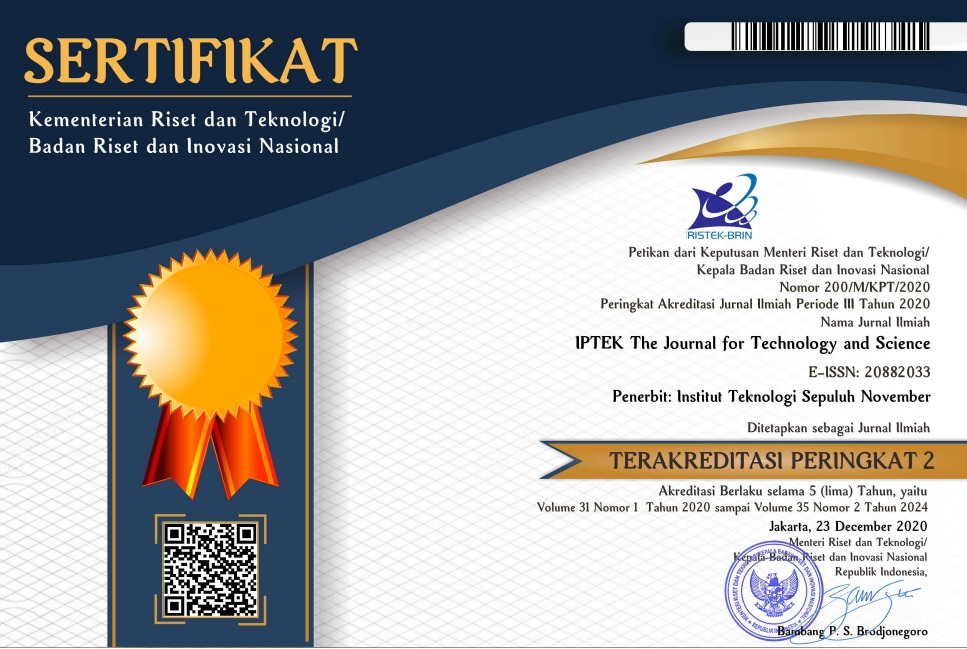Utilization Management of Landfill Zones Based on Volume of Municipal Organic Waste Simulation
Abstract
Keywords
Full Text:
PDFReferences
P. F. E. Adipraja, M. Islamiyah, dan I. Wahyuni, “Prediksi Produksi Biogas Tahunan Dengan Pendekatan Sistem Dinamik Untuk Optimasi Kapasitas Sampah TPAS Talangagung (Prediction of Annual Biogas Production With System Dynamic Approach to Optimize The TPAS Talangagung Capacity),” in Seminar Nasional Inovasi Teknologi, 2017, vol. 1, no. 1, hal. 385–390.
DCKTR, Profil TPA Wisata Edukasi Talangagung Kepanjen Kabupaten Malang (Profile of The Tourism Education of TPA Talangagung Kepanjen Malang Regency). Malang: Dinas Cipta Karya dan Tata Ruang, 2014.
A. S. Suryani, “Jalan Terjal Bersihkan Negeri (Rough Roads to Clean The Country),” Aspirasi, vol. 6, no. 1, hal. 93–103, 2015.
P. F. E. Adipraja dan M. Islamiyah, “Prediksi Volume Sampah TPAS Talangagung dengan Pendekatan Sistem Dinamik (Prediction of Waste Volume of TPAS Talangagung: A Systems Dynamic Approach),” SMATIKA J., vol. 6, no. 2, hal. 24–28, 2016.
R. A. G. I. Sumantri dan E. S. Pandebesie, “Potensi Daur Ulang dan Partisipasi Masyarakat Dalam Pengelolaan Sampah di Kecamatan Jabon, Kabupaten Sidoarjo (Potential of Recycling and Public Participation in Waste Management in Jabon Sub-district, Sidoarjo Regency),” J. Tek. ITS, vol. 4, no. 1, hal. D11–D15, 2015.
C. Wang, “System dynamics simulation on municipal solid waste in Hong Kong,” Proc. Inst. Civ. Eng. - Munic. Eng., hal. 1–11, 2017.
I. A. Al-Khatib, D. Eleyan, dan J. Garfield, “A system dynamics model to predict municipal waste generation and management costs in developing areas,” J. Solid Waste Technol. Manag., vol. 41, no. 2, hal. 109–120, 2015.
S. Goel, V. P. Ranjan, B. Bardhan, dan T. Hazra, “Forecasting Solid Waste Generation Rates,” in Modelling Trends in Solid and Hazardous Waste Management, Springer, 2017, hal. 35–64.
G. P. Richardson, Encyclopedia of Operations Research and Management Science: System Dynamics. 2013.
Y. Barlas, “Formal aspects of model validity and validation in system dynamics,” Syst. Dyn. Rev., vol. 12, no. 3, hal. 183–210, 1996.
R. P. Ellis, “Asset Utilization : A Metric for Focusing Reliability Efforts,” in Seventh International Conference on Process Plant Reliability, 1998, hal. 1–10.
A. Patidar, R. Gupta, dan A. Tiwari, “Enhancement of Bio-Degradation of Bio-Solids Via Microbial Inoculation in Integrated Composting and Vermicomposting Technology,” 2012.
DOI: http://dx.doi.org/10.12962%2Fj20882033.v29i1.3015
Refbacks
- There are currently no refbacks.
IPTEK Journal of Science and Technology by Lembaga Penelitian dan Pengabdian kepada Masyarakat, ITS is licensed under a Creative Commons Attribution-ShareAlike 4.0 International License.
Based on a work at https://iptek.its.ac.id/index.php/jts.


